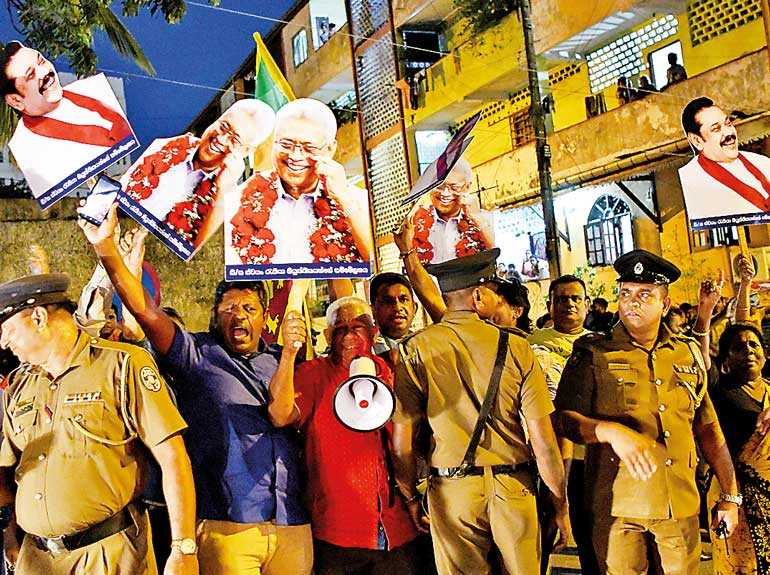Friday Feb 20, 2026
Friday Feb 20, 2026
Wednesday, 13 November 2019 00:38 - - {{hitsCtrl.values.hits}}

Supporters of presidential candidate Gotabaya Rajapaksa at a rally – Pic by Shehan Gunasekara
By Meera Srinivasan
The Hindu: “I brought my child along just so he can see our leader, even if from a distance,” said Sepalika Harshani, 29, carrying her toddler under an umbrella.
She was among thousands who flocked to Wellawaya town in Sri Lanka’s southern Monaragala district on Saturday afternoon, braving the rain. They had come for the rally of Gotabaya Rajapaksa, candidate from their favourite political clan, in the final lap of the 16 November Presidential Poll campaign.
“I would be very happy if someone like him becomes President of this country. He got us freedom,” Harshani said, referring to the war’s end in 2009 under the Rajapaksa administration.
Gotabaya, brother of former President Mahinda Rajapaksa was Defence Secretary, directing the military that defeated the rebel Tigers.
Nineteen-year-old A.P.D. Seuvandi, too, was there to catch a glimpse of the leader she has decided to vote for next weekend. “They saved the country,” the first-time voter said. She was barely nine when the war ended but has grown up listening to a popular story of its end; one quite different from what Tamils of the north and east would tell. “He will make the country safe again, develop it and improve education standards for us.”
For many Sri Lankans, safety has become a major concern after the Easter Sunday terror attacks in April.
In the island’s southern hinterland, almost every local, including those supporting Gotabaya’s main opponent Sajith Premadasa, assert that “a majority here will vote for Gotabaya”. Past election results are proof enough for that sentiment. Even in 2015, an election that former President Mahinda Rajapaksa lost, most of the southern districts gave him over 60% of the vote share.
Historically a stronghold of Mahinda Rajapaksa’s former Sri Lanka Freedom Party, the southern belt seems to have readily embraced his newly-formed the Sri Lanka Podujana Peramuna (SLPP or People’s Party).
Diverse reasons
The reasons pulling voters towards Gotabaya this time go beyond war “victory”. Some of them are looking for respite from the everyday economic strain they associate with the incumbent Government, or are utterly disenchanted with it, like daily-waged labourer D.M. Jayaratne.
“This Government came to power saying they would catch corrupt thieves. Nothing happened in the last five years. Instead, they robbed the Central Bank,” he said, referring to the “bond scam”, in which a former head of the apex bank was accused of manipulating bond auctions in 2015, causing a loss of millions. The scandal was a major blow to the Government that rose to power months earlier, that too on the promise of “good governance”.
Further, Jayaratne sees Gotabaya as a strong leader who will not “give into Tamil demands” for war-time accountability and self-rule.
Election vs. real issues
Many voters, across Monaragala [Uva Province] and the neighbouring Hambantota [Southern Province] district, began their poll analysis with a reading of the two main candidates — and less often of the leftist Janatha Vimukthi Peramuna’s contestant Anura Kumara Dissanayake. But invariably, they spoke about pressing local concerns.
They pointed to land hunger, in the wake of mega development projects in Hambantota – a Chinese-built port and an adjoining industrial zone proposed over 15,000 acres. They worried about loss of livelihoods and falling incomes. “There are no jobs here,” was a common refrain.
The irony was glaring. While billions of rupees have been channelled into the Rajapaksa-era development projects over the last decade, locals repeatedly speak of prevalent poverty. To the outside world, Hambantota is a high-profile emerging district, and a site of a regional geo-political tussle with a Chinese-built port and the loss-making Mattala airport nearby, that India is interested in developing. But to many who live there, the development projects are at best distant and at worst, a threat.
Hoping for change
Both the Rajapaksas and Premadasa are closely associated with the southern districts — either by familial links, or their parliamentary seats.
The constant fear of further marginalisation is making some voters consider a shift towards Premadasa. While it may not dull the Rajapaksa sheen yet, it points to Premadasa’s growing base, especially in the rural areas.
For K. L. Pradeepa Priyadarshini, Premadasa’s candidacy brings back the hope she felt during his father Ranasinghe Premadasa’s rule in the early 1990s. “Hearing about his poverty alleviation programs on radio, I felt here is a national leader who has finally spoken about our need for food and water,” said the Hambantota-based farmer.
“When you sit in air-conditioned rooms, you can’t feel the heat and dust that people like us feel every day.” To her, Premadasa appears different, with a largely unblemished political record and fair success as Housing Minister.
Not who, but what
Supporters of Gotabaya are nostalgic about the past. Mahinda Rajapaksa ended the war, built roads and expanded rural electricity. But those drawn to Premadasa are looking at what he might do in future.
Some voters are tired of thinking about who to vote for. They’d rather think about what to vote for.
A group of women farmers in Monaragala district are basing their decision on candidates’ manifestos. “We are looking at what they have said about women, farmers, national unity, rural debt, especially microfinance-induced debt, and education policy,” said S.A. Shanthi.
They also challenged the idea of “national security” that has become a chief election issue, in the wake of the Easter bombings. To ensure national security, we don’t need a strong leader. We just need sound policies.”
“Whose security are they talking about?” asked P.G. Podinona. “Seeing the number of security guards around some candidates, it’s obvious who feels most insecure in this country. Whereas some of us don’t even have a dog to guard us.”